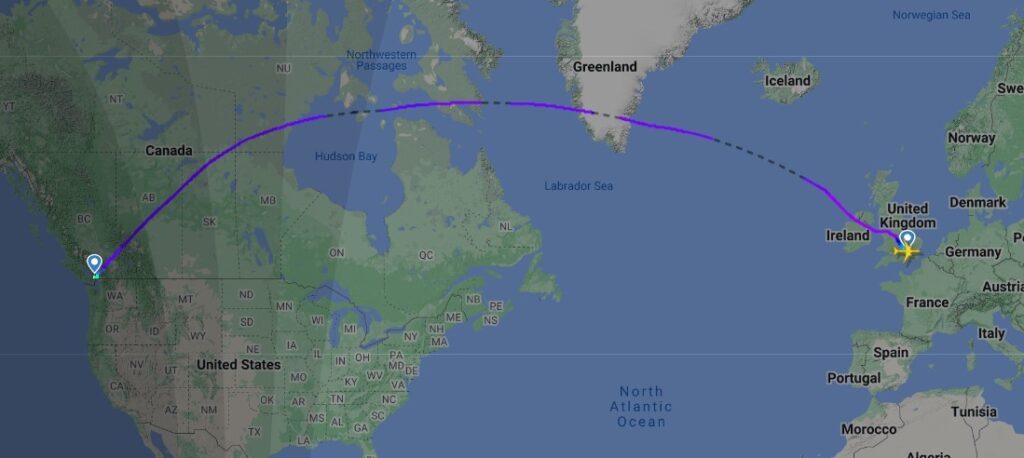Air Canada 777 struck by lightning in Vancouver, continues to London: video

An Air Canada Boeing 777-300ER was struck by lightning as it departed Vancouver and headed to London on March 3, 2024. The aircraft continued after the incident, which was captured on video, landing safely in London almost nine hours later.
The flight involved was Air Canada AC860 operated by one of the carrier’s 19-strong fleet of Boeing 777-300ERs registered C-FIVQ. The flight took off from runway 08R at Vancouver International Airport (YVR) at 19:24 local time for the flight to London Heathrow Airport (LHR). Flight AC860 is Air Canada’s single daily flight between the two cities.
A video posted on social media shows the aircraft climbing out after takeoff, with just its lights visible through the low cloud, mist, and rain that surrounded the airport at the time of departure. As the video continues, a huge flash of lightning suddenly strikes the aircraft as it climbs, causing a large flash.
The aircraft remains steady despite the strike and continues on its course across northern Canada, Greenland, and the Atlantic Ocean to land at London-Heathrow eight hours and 53 minutes later at 12:17 on March 4, 2024.
According to a statement issued by Air Canada following the event, the aircraft was fully inspected for damage upon arrival at Heathrow. However, with no visible damage found, the aircraft was turned around at Heathrow and soon headed back to Canada, operating flight AC859 to Toronto and departing London at 18:30 that same day.

The aircraft has since been back to London, as well as visiting Tokyo (HND) and Munich (MUC), in the days since the incident.
According to data from ch-aviation, the aircraft involved is 15.3 years old, having first been delivered to Air Canada directly from Boeing in December 2008. The aircraft is powered by a pair of General Electric GE90 turbofans and has a capacity for 400 passengers in a three-class configuration (40 business class, 24 premium economy, and 336 in economy).
More about lightning strikes
Lightning strikes on aircraft are not uncommon and numerous airliners sustain lightning strikes each year. What is uncommon about this incident is that it was captured on video – not an accomplishment easily achieved!
Modern airliners are designed and built to withstand lightning strikes, although some can sustain some damage as a result. Boeing 787s with their largely composite fuselage structures have seen at least two incidents in the past two years where they have been damaged by lightning strikes.
In December 2023, an American Airlines Boeing 787-9 suffered some damage around a passenger window when it was struck by lightning en route from Tokyo (HND) to Dallas (DFW). The aircraft sustained burn damage to the top of its fuselage which has since been repaired.
Meanwhile further back in Australia in May 2022, a Jetstar Boeing 787-8 had to be withdrawn from service for two months after a lightning strike inflicted significant damage to the aircraft during a flight from Melbourne (MEL) to the Gold Coast Airport (OOL).
When lightning strikes an aircraft, typically the bolt will enter at the nose or wing tip before it travels through the fuselage of the aircraft and exits at an extremity of the airframe such as the tail or the opposing wing tip. Equally, aircraft fuselages form a continuous conductive path that largely prevents the electric current from entering the passenger cabin. This ensures complete protection for both the passengers and the aircraft’s electrical systems, and often those onboard will not realize that their plane has even been struck.
According to the Flight Safety Foundation’s global database, there has not been a major commercial airliner crash attributed to a lightning strike anywhere in the world since 1988.
The post Air Canada 777 struck by lightning in Vancouver, continues to London: video appeared first on AeroTime.
An Air Canada Boeing 777-300ER was struck by lightning as it departed Vancouver and headed to London on…
The post Air Canada 777 struck by lightning in Vancouver, continues to London: video appeared first on AeroTime.







